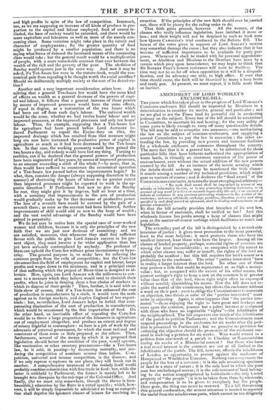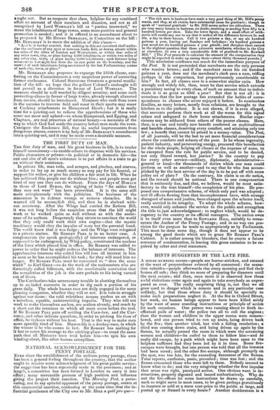AMENDMENT OF LORD WORSLEY'S ENCLOSURE-BILL.
THE pause which has taken place in the progress of Lord WORSLEY'S Commons-enclosure Bill should be improved by Members in a
determination to consider its merits, general and particular ; and we are glad to see the Times lend its powerful aid in awakening jealousy on the subject. Every line of the bill should be scrutinized in Committee, to ascertain its real bearing ; for the very utility of some parts is likely enough to carry off many questionable details. The bill may be said to comprise two measures,—one methodizing the law on the subject of common-enclosures, and supplying a central Commission to put the law in execution ; the other ex- tending the law, by providing new powers and immense facilities for a wholesale enclosure of commons throughout the country. The mere fact that it is a general law, to be substituted for those particular bills that have hitherto authorized the appropriation of waste lands, is virtually an enormous extension of the power of encroachment, even without the actual addition of the new powers created by the bill. As an instance of the severe scrutiny which the details should undergo, may be mentioned the 96th clause : it stands among a number of dry technical provisions, which might pass as matters of course ; and it declares the "final award" of the Commissioners conclusive, in terms the most sweeping and arbitrary-
. No such final award shall be impeached by reason of any mistake or informality therein, or in any proceeding relating thereunto, or on account of any want of notices or consents required by this act, or on account of defects or omissions in any previous proceeding whatever in the matter of the enclosure; and every allotment, exchange, partition, direction, matter and thing specified in such final award as aforesaid, shall be binding and conclusive on all persons whomsoever."
So that the bill actually provides that breaches of its own law, when in favour of enclosure, shall be ratified as law I And this wholesale licence lies perdu among a heap of clauses that might pass as the matter-of-course verbiage which facilitates so much bad legislation.
The extending part of the bill is distinguished by a remarkable inversion of justice : it gives most protection to the most powerful, least to the most helpless ; it most protects those who have the smallest interest, least those who have the largest. Among all the classes of landed property, perhaps, manorial rights of common are among the most inconsiderable ; as compared with the extent to which other classes may suffer or benefit, the rights of the lord are probably the smallest : but this bill requires the lord's assent as a preliminary to the enclosure. The other "parties interested " have in reality a larger interest than the lord. No other one of them may possess a title that could be represented at so high a money- value ; but, as compared with the extent of his other means, the poorest cottager's right to keep a cow on the common is of greater value than that of the lord, whose right might often be expunged without sensibly diminishing his means. Now the bill does not re- quire the assent of the commoners, but allows the enclosure without a word on their part : even to oblige the Commissioners to entertain an objection, two-thirds in value of the "parties interested" must unite in objecting. Again, it often happens that "the parties inte- rested "—those enjoying the right to turn geese and donkeys and cows upon the common, possess but a paltry interest as compared with those who have no cognizable "rights "—the inhabitants of the neighbourhood. The bill empowers one-tenth of the inhabitants of the parish to petition Parliament ; and the Commissioners must suspend proceedings in the enclosure for six weeks after the peti- tion is presented to Parliament ; but we perceive no provision for enforcing the objection should the promoters of the enclosure suc- ceed in shelving a petition for six weeks. Who would attend to a petition from one-tenth of a parish in Cheshire or Somersetshire during six weeks of a Ministerial contest ? But those who have a real moral interest in the common are not at all limited to the inhabitants of the parish. The bill, however, affords the inhabitants of London no opportunity to protest against the enclosure of Hampstead or Wimbledon Common. Nothing can compensate the people for the loss of a common : it is the sole remaining specimen of land in a state of nature ; it is the only laud to which the poor man has unchallenged access; it is the sole remnant of' laud belong- ing to the nation unappropriated by individuals—the only landed property of" the people" : it is to be taken from them by wholesale, , and compensation is to be given to everybody but the people. Once gone, the thing can never be restored. To a bill threatening this general confiscation, the utmost attention is needed to separate the useful from the mischievous parts, which cannot be too diligently sought out. But as respects that class, helpless for any combined effort on account of their numbers and disunion, and not at all recognized by Lord WORSLEY.S bill as "parties interested," we mean the inhabitants of large towns, some more positive and general protection is needed ; and it is offered in an amendment about to be proposed by Mr. HENRY BERKELEY, in Committee on the bill : Mr. BERKELEY is to move the addition of this clause— "Aid be it further enacted, that nothing in this act contained shall autho- rize the enclosure of any open or common lands, field, or downs, situate within ten miles of the cities of London and Westminster, or within four miles of any other town, city, or place having 4.000 inhabitants, or within two miles of any other city, town, cr place having 2,000 inhabitants ; such distance being measuie I in a attai,:ht line from the ne 'refit point on the boundary, and the sumo r of such inhabitants being ascertained by the last Parliamentary census of such city, town, or place."
Mr. BERKELEY also proposes to expunge the 135th clause, con- ferring on the Commissioners a very suspicious power of correcting former enclosures. Colonel SIBTUORP threatens a general mutila- tion of the bill: we hope that the gallant Colonel's onslaught will not prevail as a diversion in favour of Lord WORSLEY. The measure should be well weeded by diligent scrutiny, and some such protecting-clause in favour of large towns, already enough alienated from nature, should be introduced. Members who rush from town in the autumn to traverse field and moor in their sports may sneer at Cockney attachments to Hampstead Heath ; but it is really time for a quieting-act to relieve the apprehensions of those who never see moor and upland—to whom Hampstead, and Epping, and Clapham, are real preserves of natural beauty—a memento of the way in which God had made the country before man made the town. Castigate the Enclosure Bill, free its useful improvements from dangerous abuses, convert it by help of Mr. BERKELEY'S amendment into a quieting-act, and it may be made even a desirable measure.



























 Previous page
Previous page